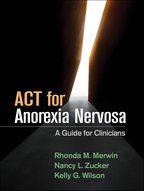ACT for Anorexia Nervosa
A Guide for Clinicians
Rhonda M. Merwin, Nancy L. Zucker, and Kelly G. Wilson
HardcoverPaperbacke-bookprint + e-book
Hardcover
orderJuly 9, 2019
ISBN 9781462540358
Price: $66.00 286 Pages
Size: 8" x 10½"
Paperback
orderJuly 25, 2019
ISBN 9781462540341
Price: $44.00286 Pages
Size: 8" x 10½"
Sign up for emails on upcoming titles on Mindfulness (with special discounts)!
The reproducible materials can be downloaded and printed in PDF format.
The reproducible materials can be downloaded and printed in PDF format.
“A treasure trove of clinically useful material aimed at helping individuals change restrictive eating patterns. The principles of ACT, including the use of patients' own values and beliefs to inform their behavioral choices, are well matched to the needs of individuals with AN. With clarity and compassion, the authors offer the clinician practical strategies to help patients move toward health.”

—Evelyn Attia, MD, Department of Psychiatry, Columbia University Medical Center; Director, Center for Eating Disorders, New York Presbyterian Hospital
“This book sits atop a growing body of evidence that psychological flexibility is of direct relevance to patients struggling with AN. It is one thing to know that a set of change processes are relevant, and another to learn how best to target them. This book is the first comprehensive attempt to teach providers how to treat AN using a rich variety of techniques drawn from ACT and the third wave of cognitive-behavioral therapy. ACT is early in its journey as an evidence-based approach in this area, but this well-written book opens up new pathways to explore when existing gold-standard approaches are not enough. Highly recommended.”

—Steven C. Hayes, PhD, codeveloper of ACT; Foundation Professor of Psychology Emeritus, University of Nevada, Reno
“This book is a gift—it is an accessible read that offers a wealth of new ways to respond to the unrelenting rigidity that can characterize restrictive eating behaviors. Extensive client–therapist dialogues and clinical metaphors help clinicians decode the atypical thinking that supports excessive restriction and illustrate a fresh approach to treatment. The authors are highly experienced, and their personal responses throughout the manual provide much-needed validation for therapists working to manage their own reactions to these challenging clients.”

—Linda W. Craighead, PhD, Department of Psychology, Emory University
“This book gives us the rarest of combinations—authors with a strong command of assessment and treatment of AN, and a stunning array of clinician support tools that allow even the novice therapist to execute the ACT approach with a high degree of fidelity. The writing style is intensely practical; many highly informative case examples and clinical dialogues demonstrate the core features of ACT. The authors do a wonderful job of constructing a biopsychosocial treatment framework that flawlessly balances the role of psychological and medical interventions.”

—Kirk Strosahl, PhD, co-developer of ACT
“The authors have provided an invaluable volume for those interested in understanding or treating this vexing, challenging illness. ACT is particularly well suited to address the cognitive rigidity, avoidance of emotion, and narrowing of experience that characterize AN, and to promote the clarification of personal values needed to build a meaningful life. The book is rich with clinical examples and transcripts, as well as therapist resources and reproducible tools.”

—Marsha D. Marcus, PhD, Department of Psychiatry, University of Pittsburgh School of Medicine
—Evelyn Attia, MD, Department of Psychiatry, Columbia University Medical Center; Director, Center for Eating Disorders, New York Presbyterian Hospital
“This book sits atop a growing body of evidence that psychological flexibility is of direct relevance to patients struggling with AN. It is one thing to know that a set of change processes are relevant, and another to learn how best to target them. This book is the first comprehensive attempt to teach providers how to treat AN using a rich variety of techniques drawn from ACT and the third wave of cognitive-behavioral therapy. ACT is early in its journey as an evidence-based approach in this area, but this well-written book opens up new pathways to explore when existing gold-standard approaches are not enough. Highly recommended.”
—Steven C. Hayes, PhD, codeveloper of ACT; Foundation Professor of Psychology Emeritus, University of Nevada, Reno
“This book is a gift—it is an accessible read that offers a wealth of new ways to respond to the unrelenting rigidity that can characterize restrictive eating behaviors. Extensive client–therapist dialogues and clinical metaphors help clinicians decode the atypical thinking that supports excessive restriction and illustrate a fresh approach to treatment. The authors are highly experienced, and their personal responses throughout the manual provide much-needed validation for therapists working to manage their own reactions to these challenging clients.”
—Linda W. Craighead, PhD, Department of Psychology, Emory University
“This book gives us the rarest of combinations—authors with a strong command of assessment and treatment of AN, and a stunning array of clinician support tools that allow even the novice therapist to execute the ACT approach with a high degree of fidelity. The writing style is intensely practical; many highly informative case examples and clinical dialogues demonstrate the core features of ACT. The authors do a wonderful job of constructing a biopsychosocial treatment framework that flawlessly balances the role of psychological and medical interventions.”
—Kirk Strosahl, PhD, co-developer of ACT
“The authors have provided an invaluable volume for those interested in understanding or treating this vexing, challenging illness. ACT is particularly well suited to address the cognitive rigidity, avoidance of emotion, and narrowing of experience that characterize AN, and to promote the clarification of personal values needed to build a meaningful life. The book is rich with clinical examples and transcripts, as well as therapist resources and reproducible tools.”
—Marsha D. Marcus, PhD, Department of Psychiatry, University of Pittsburgh School of Medicine



